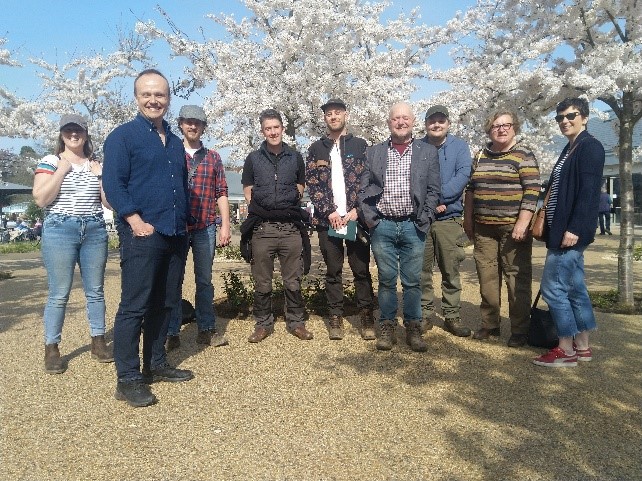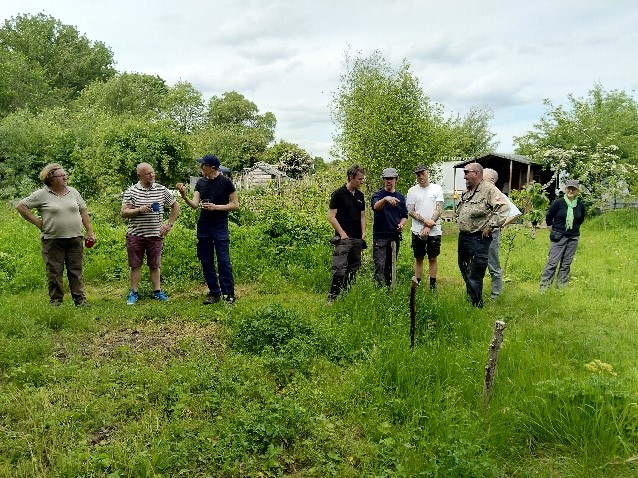BRINGING COMMUNITY GARDENS TOGETHER TO SUPPORT FLOOD RESILIENCE
Led by:
The Flood Innovation Centre has brought together a varied group of Hull and East Riding organisations who are working on different community gardening/ growing and drainage projects. The collaboration was kickstarted by a Flood Innovation Centre visit to RHS Wisley to share research and experience on flooding and community gardening.

The challenge
PROJECT PARTNERS






SUPPORTING FLOOD RESILIENCE IN THE COMMUNITY
Hull and the East Riding of Yorkshire face significant flood risk from coastal, fluvial and surface water flooding. There are several groups whose work focusses on community-based gardens or other environmental projects. These groups, and the local communities where they are based face a number of challenges, for instance, some of the gardens are impacted by flooding during heavy rains, but then have to cope with extended dry periods, bringing issues around water management, sustainable drainage and appropriate planting.
The Flood Innovation Centre identified potential for organisations to become ambassadors for flood resilience within their communities through their core work around gardening. This could bring opportunity for wider activities around support to develop flood plans and flood kits or even flood recovery. The team were already aware of two groups interested in developing expertise in sustainable drainage.

The solution
PROJECT LEAD
Dr Sam Ramsen
Charities Support Coordinator
A PROGRAMME OF IN-PERSON VISITS FOR HANDS-ON LEARNING
The Flood Innovation Centre brought in a new team member, Dr Sam Ramsden, who has extensive experience of working with community and grass-roots organisations. Dr Ramsden reached out to a number of organisations, to find out about their needs and interests.
It was felt a themed group activity should be organised in order to bring the organisations together, with lots of opportunities for learning and discussion. A trip to RHS Wisley in March was arranged as, with the aim of researching horticulture and appropriate planting. The group met with RHS Wisley researchers: Dr Mark Gush – HoD Environmental Horticulture, Dr Tijana Blanusa – RHS Principal Horticultural Scientist & Dr Elisabeth Larsen – Tree Research Fellow. The gardening groups from Hull & East Riding were able to share knowledge & experience with RHS Wisley researchers on the ecosystem services provided by different plants and trees, plus the types of horticulture suitable for gardens prone to flooding. The scientists at RHS Wisley was also really interested to hear more about the different social aims of the groups. The group also learned how RHS Wisley’s ongoing research feeds into the Royal Horticultural Society (RHS) online tools to help gardeners including the RHS Plant finder & selector which suggests plants based on garden types. There was a really interesting exchange on the use of native species: the local gardening groups are very focused on native species whereas this is currently less of a focus for the researchers at RHS Wisley, but we will watch this space.
As well as drawing on external expertise, the group will showcase the capabilities of member organisations. A follow-up meeting was held in May at the Down to Earth allotment, with the hosts providing a guided tour to demonstrate the different work being undertaken at the plot. The meeting was opened up to new members – all but one of the original organisations attended, and a new organisation, West Wolds Slow the Flow joined, with Anlaby Communities Trust expressing an interest in joining at a later date.
The Flood Innovation Centre will continue to support this group, providing a framework to crystallise the groups’ main aims which will be discussed at the next meeting in September. We have organised further activities, including attending an information-sharing event about Living with Water’s Green-Blue infrastructure plans, and tours of the University Campus SuDSlab. In addition, we have offered to support any groups that want to submit bids to the Ideas Fund, which would be an ideal way for individual organisations to explore work on flood resilience.
“privileged to visit RHS Wisley to meet their science team and learn more about plant & tree ecosystem services. We’re excited to work with community groups in Hull now to apply this learning to local flood alleviation projects. Huge thanks to the Flood Innovation Centre for their support.”
Andy Steele,
Director of Down to Earth and Yorkshire Wildlife Trust Engagement Officer
The Results
AN ONGOING FORUM FOR SHARING EXPERIENCE
The project has stimulated a significant desire on behalf of the organisations to contribute to flood resilience and environmental sustainability in Hull. This focus on flood resilience is new to the group and is very relevant to the local area. The organisations found benefit in coming together as a group and are keen to continue joint working and to actively seek new members. The group was particularly interested to hear of the wide range of flood resilience projects and activities existing in the Humber Region and look forward to inputting its expertise from a community-level and gardening perspective.
The group have expressed an interest in applying a number of approaches that are relevant to the challenges facing Hull and surrounding areas:
- Provide support to local groups & individuals to incorporate flood alleviation and water management into their site designs & gardening practices
- Provide support to local groups working on community-level flood projects e.g. developing flood plans, gardens to help flood recovery
- Input community views into flood alleviation planning e.g. Living with Water Green-Blue infrastructure plans
- Source external expertise relating to flood gardening for education and training
- Obtain funds to develop a model flood garden or rain garden.
We are already seeing interesting linkages being developed between the different organisations for their own individual plans. We will continue to promote the group further community-based organisations based in the region to increase the project’s positive impact on regional flood resilience.
